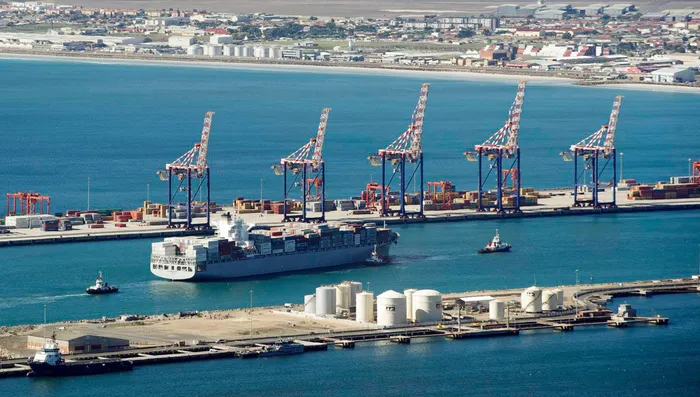Cape Town port operations 'need private investment to weather storm challenges'

Cape Town's port operations face significant challenges due to wind disruptions.
Image: File
Authorities at Transnet have taken measures to improve operations at ports following strong winds that led to a reduction in fruit exports in February.
This, while Cape Town mayco member for Economic Growth, James Vos, said Cape ports were in need of private investment to overcome challenges.
Last month, Oscar Borchards, Transnet’s acting managing executive for terminals in the province, said they have created a plan that includes new equipment that can withstand higher wind speeds.
The wind saw disruptions to the loading of vessels and that of cargo handling, with staff recalled to duty to alleviate a backlog after more than 200 operational hours were lost due to wind speeds of up to 125 kilometers per hour were experienced.
Vos said it was for this reason that private investment was needed.
“Last month, operations at the Port of Cape Town came to a grinding halt, again, due to wind.
"But is the wind really to blame? Cities around the world experience similar weather conditions, yet their ports keep moving because they invest in the right technology, equipment, and skilled manpower to get the job done,” said Vos.
He said according to research the City conducted, private investment could see a R6 billion injection into the industry and offer employment.
“The reality is that we need to strengthen the port’s resilience and efficiency.
"Research shows that privatizing the port could unlock an additional R6 billion in exports, create around 20 000 jobs, and generate R1.6 billion in tax revenues over the next five years,” he said.
Transnet on Sunday said they were unable to respond to queries regarding the investment call as it was the weekend.
Meanwhile, the incoming CEO of the Citrus Growers' Association of Southern Africa, Boitshoko Ntshabele, underscored the industry's potential during the 5th Citrus Summit hosted in Gqeberha from March 11 - 13.
"Increased market access is crucial. Projections show the industry can create 100 000 jobs by 2032. It can do this through increasing exports with roughly 95 million 15kg cartons to a total of 260 million cartons," he said.
Logistics expert, Thomas Eskesen, reminded delegates that port inefficiency comes at a real cost.
In his opinion, the recent study by the Bureau for Food and Agricultural Policy (BFAP) that found the total cost of inefficient logistics to the citrus industry amounted to R5.27 billion per year, was "highly underestimated".
Eric Imbert, a lead researcher from the French agricultural research centre CIRAD, pointed out that South Africa's citrus industry has the potential to rise to the current challenging trading environment.
"South Africa has a relatively diversified market, innovative research capability, a large and fast evolving variety range, and a strong industry organisation with significant capacity."
Cape Argus
